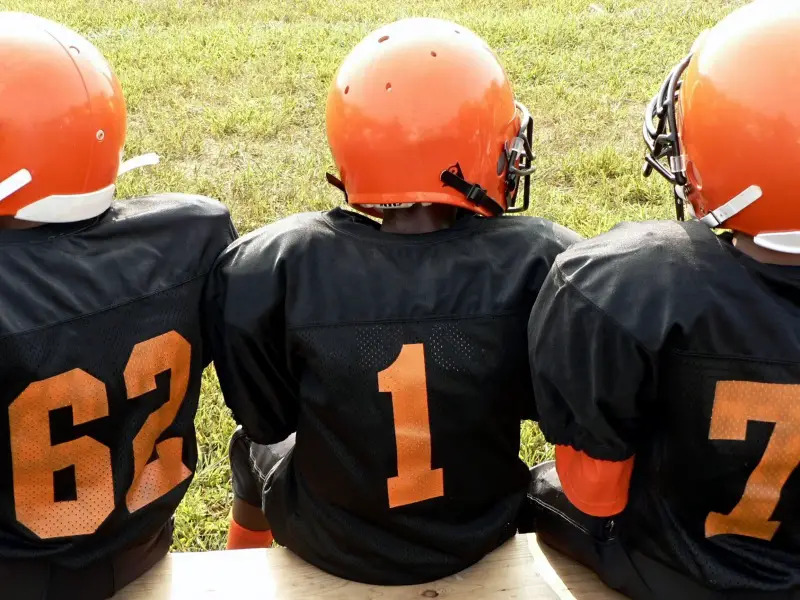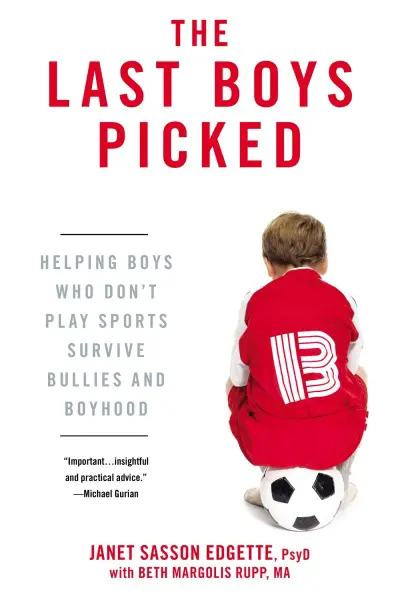What happens when you are raising a boy who has no interest in sports? Society has deemed that raising boys to play sports is the norm, and often times as a result, these boys become the targets of bullying. Written by a psychologist and an educational consultant, “The Last Boys Picked” shows parents how to help their child build resilience and a healthy self-esteem.
To Play or Not to Play? That is the question when a child insists he does not want to try out for a sports team—but what is a parent to do? Forcing your kid or giving in are not your only solutions. A renowned child psychologist offers advice in “The Last Boys Picked.”
So…do I insist or not?
Your son is making it clear that he doesn’t want to go. He might be adamant, anxious, even tearful. Saying to him Okay, we’ll pass on it feels too soft and all but promises a repeat performance the next time your son’s supposed to be somewhere he doesn’t want to be. On the other hand, insisting he go—tears or panic or tantrum and all—feels too authoritarian, and downright unkind. What to do?
 Let’s go back to the kid who doesn’t want to go to wherever it is he’s supposed to be headed. A best-case scenario for insisting your son go is that he discovers, to everyone’s surprise, that he likes this or that sport more than he thought he would, or that he is better at it than he had believed. A feeling of Okay, I can probably do this may be all the encouragement he needs in order to take it a little further—all of which will evaporate in the wake of a parent saying something along the lines of Hey, I told you you’ d like it! or See! You just had to stick with it! Parents are often surprised to hear this—What’s wrong with saying that? They challenge. What? Am I just supposed to say nothing?
Let’s go back to the kid who doesn’t want to go to wherever it is he’s supposed to be headed. A best-case scenario for insisting your son go is that he discovers, to everyone’s surprise, that he likes this or that sport more than he thought he would, or that he is better at it than he had believed. A feeling of Okay, I can probably do this may be all the encouragement he needs in order to take it a little further—all of which will evaporate in the wake of a parent saying something along the lines of Hey, I told you you’ d like it! or See! You just had to stick with it! Parents are often surprised to hear this—What’s wrong with saying that? They challenge. What? Am I just supposed to say nothing?
No, not nothing—but certainly not that. Because as brief and well intentioned as the remark is, it is still going to o?end the child. It says to him, You see, I knew all along that this would happen. You should have just listened to me in the ?rst place. Which says, I know what the outcome in these situations is going to be, which is just another way of saying, I really do know better about these things. Maybe you do—but that’s not what matters here. What matters is making sure your son doesn’t feel embarrassed for doing something his parent were “right” about. And there’s nothing that says I respect you more than choosing not to jump on an opportunity to say out loud that you were right and the other person was wrong.
A more supportive thing to say in these instances would be Hey, nice job or That was terri?c or Nice surprise to ?nd out you’re not half bad at that, isn’t it? Good for you. And then, instead of assuming your son will build on that experience by doing more, ask him what he wants to do next, as in, Do you want to try this again? Or more strongly, Hey, I’m hoping you’ll use what happened today to try some other things you haven’t wanted to try . . . These kinds of remarks keep you and your child on the same side of the fence while tackling what has likely been, over the years, a thorny and contentious issue.
What To Do If Results Aren’t Good
But what if the results aren’t good: Your son falters, ?nds out that he really hates the activity, discovers he’s as bad as he thought he’d be. What then? Move on to something else and appreciate that he tried. Probably the worst thing to do would be to insist he continue to play. He will not get much better and he sure won’t hate it any less. If he’s forced to get better by being signed up for a run of private lessons, then what you’ll have is a miserable kid who plays a sport adequately. And the takeaway for him?
 It is more important that he be marginally competent in an arena his parent has decided is important for him (socially, personally) than for the two of them to take the time to discover his genuine areas of competence, and more important, his genuine areas of interest. The contested issue here is not parents’ wishes to equip their sons with skills believed to be important for their growth and social well-being. It is the matter of respect. The intent may be very sound, but the means by which it is or isn’t accomplished may or may not play out in a way the child recognizes as respectful.
It is more important that he be marginally competent in an arena his parent has decided is important for him (socially, personally) than for the two of them to take the time to discover his genuine areas of competence, and more important, his genuine areas of interest. The contested issue here is not parents’ wishes to equip their sons with skills believed to be important for their growth and social well-being. It is the matter of respect. The intent may be very sound, but the means by which it is or isn’t accomplished may or may not play out in a way the child recognizes as respectful.
Parents worry that by relenting they risk losing their credibility and power. If that happens, then it’s more likely to be a function of the quality of the relationships within the family than the parents giving in. With a few exceptions, a person’s credibility and power to in?uence loved ones are suitably robust to stand up to any one bad decision or action. I think parents in healthy relationships with their children stand to gain their respect and establish even greater credibility when they make such comments as,
|

“The Last Boys Picked.” addresses an overlooked group of boys who aren’t interested in the behaviors that society has deemed fit for boys and who are all too often the targets of bullying.
Reprinted from “The Last Boys Picked” by Janet Sasson Edgette, PsyD with Beth Margolis Rupp, MA by arrangement with Berkley, a member of Penguin Group (USA) Inc., Copyright (c) 2012 by Janet Edgette and Beth Margolis Rupp.




















